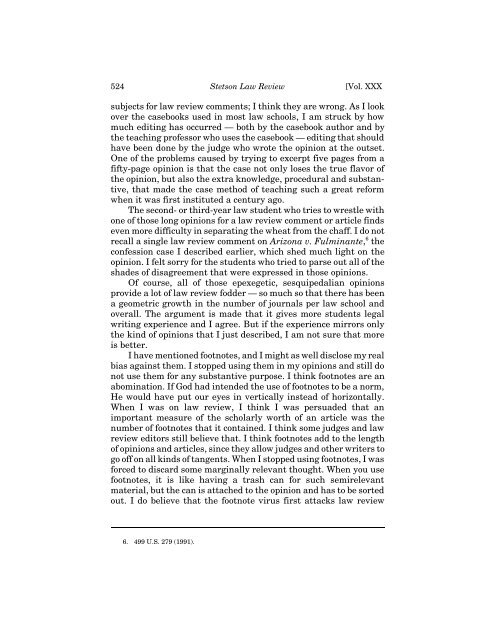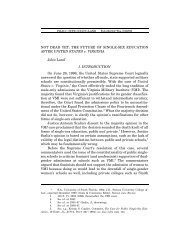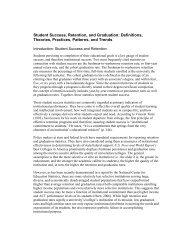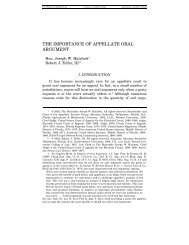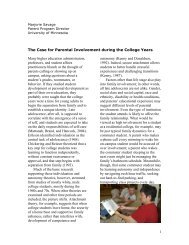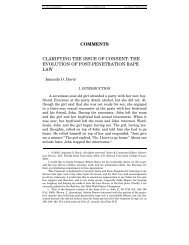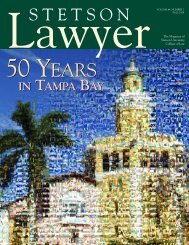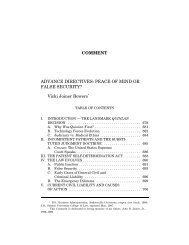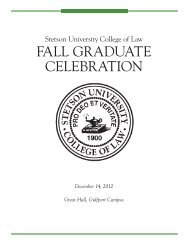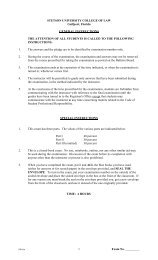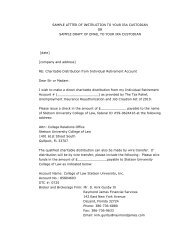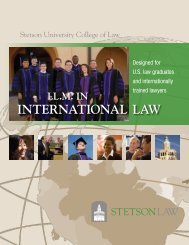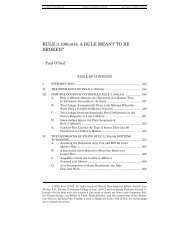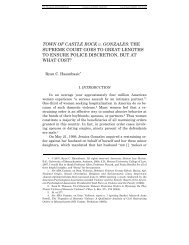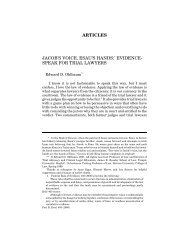Law Reviews, Judicial Opinions, and Their Relationship to Writing
Law Reviews, Judicial Opinions, and Their Relationship to Writing
Law Reviews, Judicial Opinions, and Their Relationship to Writing
Create successful ePaper yourself
Turn your PDF publications into a flip-book with our unique Google optimized e-Paper software.
524 Stetson <strong>Law</strong> Review [Vol. XXXsubjects for law review comments; I think they are wrong. As I lookover the casebooks used in most law schools, I am struck by howmuch editing has occurred — both by the casebook author <strong>and</strong> bythe teaching professor who uses the casebook — editing that shouldhave been done by the judge who wrote the opinion at the outset.One of the problems caused by trying <strong>to</strong> excerpt five pages from afifty-page opinion is that the case not only loses the true flavor ofthe opinion, but also the extra knowledge, procedural <strong>and</strong> substantive,that made the case method of teaching such a great reformwhen it was first instituted a century ago.The second- or third-year law student who tries <strong>to</strong> wrestle withone of those long opinions for a law review comment or article findseven more difficulty in separating the wheat from the chaff. I do notrecall a single law review comment on Arizona v. Fulminante, 6 theconfession case I described earlier, which shed much light on theopinion. I felt sorry for the students who tried <strong>to</strong> parse out all of theshades of disagreement that were expressed in those opinions.Of course, all of those epexegetic, sesquipedalian opinionsprovide a lot of law review fodder — so much so that there has beena geometric growth in the number of journals per law school <strong>and</strong>overall. The argument is made that it gives more students legalwriting experience <strong>and</strong> I agree. But if the experience mirrors onlythe kind of opinions that I just described, I am not sure that moreis better.I have mentioned footnotes, <strong>and</strong> I might as well disclose my realbias against them. I s<strong>to</strong>pped using them in my opinions <strong>and</strong> still donot use them for any substantive purpose. I think footnotes are anabomination. If God had intended the use of footnotes <strong>to</strong> be a norm,He would have put our eyes in vertically instead of horizontally.When I was on law review, I think I was persuaded that animportant measure of the scholarly worth of an article was thenumber of footnotes that it contained. I think some judges <strong>and</strong> lawreview edi<strong>to</strong>rs still believe that. I think footnotes add <strong>to</strong> the lengthof opinions <strong>and</strong> articles, since they allow judges <strong>and</strong> other writers <strong>to</strong>go off on all kinds of tangents. When I s<strong>to</strong>pped using footnotes, I wasforced <strong>to</strong> discard some marginally relevant thought. When you usefootnotes, it is like having a trash can for such semirelevantmaterial, but the can is attached <strong>to</strong> the opinion <strong>and</strong> has <strong>to</strong> be sortedout. I do believe that the footnote virus first attacks law review6. 499 U.S. 279 (1991).


